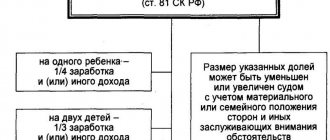Author of the article: Roman Gavrilov Last modified: March 2021 2215
Establishing paternity and collecting alimony is possible in court. But if a child is born from a man and a woman who are officially married, then the husband is considered the father of the child. The rule applies when no more than 300 days have passed since the divorce, the invalidation of the marriage, or the death of the husband. The former spouse is then recorded as the father. To record paternity, the fact of marriage registration with the civil registry office is sufficient.
Why is it necessary to establish paternity when collecting alimony?
The concept of “paternity” is not directly regulated by the current legislation. The origin (kinship) of a child implies a connection between two people, confirmed by documents that have legal force. If a man is not officially the father of a child, then he is not obliged to support him. The obligations provided for in Art. 80 of the RF IC, begin only after paternity has been established, but alimony is awarded from the moment the plaintiff goes to court (Article 107 of the RF IC).
There is a generally accepted rule about who should be considered the father. This is a person with whom the relationship is legalized by registering a marriage with government agencies.
- Paternity is determined automatically upon marriage or within 300 days of divorce.
- Automatic determination of mother and father occurs in an IVF situation.
- In case of surrogacy, an entry regarding the parents of the newborn is made with her personal consent.
- The birth of a child to a common-law couple requires paternity according to the mother, filing a joint application or establishing it through the court.
The regulation of relations in the process of establishing paternity is carried out by the legislation of the country whose citizenship the child received.
Family law has paid attention to the following issues:
- the emergence of parental powers and obligations;
- formal mechanisms for determining kinship;
- resolving disputes in court;
- filling out the appropriate columns in documents when registering the fact of birth;
- legal capacity of parents outside of marriage.
The Federal Law “On Acts of Civil Status” reveals:
- grounds for the paternity registration procedure;
- sequence of registration actions;
- paperwork;
- features of the procedure and more.
Article 48 of the RF IC defines the following mechanisms for establishing paternity:
- voluntary – a man advocates formalizing a family relationship with a child by contacting the competent government authorities to carry out registration actions. A prerequisite is the consent of the mother;
- judicial (forced) - the putative father does not recognize consanguinity and does not want to file a joint application. We'll have to go to court.
Each method of establishing paternity has individual characteristics and is characterized by a specific mechanism of action.
The procedure for determining the relationship between father and child
If the marriage is formalized, paternity will be established automatically. The mother's husband is recognized as the child's parent (Article 48 of the RF IC). When family legal relations are not registered, it is necessary to contact the child’s father and discuss the situation. If a man agrees with a closely related relationship, prepare a statement (Article 48 of the RF IC). A man and a woman draw up a document together and then contact the registry office. Based on the application, the potential father will be indicated as the father of the child.
If a man denies his relationship with a minor offspring, paternity will be established in court (Article 49 of the RF IC). The baby's mother will have to prepare a statement of claim and contact the authorized body. It will be necessary to prove the existence of a closely related relationship between the child and the father. This is usually done through DNA testing.
The procedure for establishing paternity through the registry office (voluntary)
Confirmation of paternity voluntarily presupposes the will of a man to be a legal parent.
The mother and father submit a joint application to the registry office. When confirming paternity in this way, additional requirements must be met in the following situations:
- when a child reaches 18 years of age - obtaining his consent;
- death of the mother, incapacity - participation of state guardianship and trusteeship authorities.
Providing a joint application requires the presence of parents with a document certifying the fact of the child’s birth. It is possible to notarize the signature of one of the parties.
The basis for refusal to carry out state registration is the presence of a record of the father. We are talking about information included in the act from the words of a woman without the status of an official spouse.
The court decision, which has entered into force, authorizes the registry office employee to make the appropriate mark in the document with a dash in the column about the father. Applications for registration actions may be made orally or in writing.
Which registry office should I contact?
The application can be submitted to the registry office at the registered address of the mother or father.
Required documents
For registration actions you will need:
- identification document of the applicant;
- the court's decision.
Contents and sample application
The application is filled out according to form No. 15, approved by Order of the Ministry of Justice dated October 1, 2018 No. 201 “On approval of forms...”. The essence of the text is the recognition and confirmation of paternal powers and responsibilities in relation to a child born out of wedlock. The mother's approval is required.
Sample application
Application processing time
The application is processed immediately, the certificate is issued on the day of application.
State duty
When applying to the registry office, you need to pay a fee for registering paternity and issuing a certificate - 350 rubles. (Clause 3, Clause 1, Article 333.26 of the Tax Code of the Russian Federation). The receipt for payment can be printed on the registry office website or picked up there during a personal visit.
Collection of alimony in mixed form
Collection of alimony for the maintenance of parents
Payment details
An important point is to obtain the correct payment details. It is advisable to obtain data directly from the authorized body immediately before transferring funds.
An alternative option is to obtain information on the websites of authorized organizations. However, as practice shows, it is better to clarify the information.
The procedure for establishing paternity through the court (forced)
Appeal to the court is regulated by the RF IC and the Code of Civil Procedure of the Russian Federation. This is relevant when:
- No agreement has been reached between the parents regarding the formalization of paternity; the man is against it.
- Third parties are interested in establishing the origin.
The following have the right to go to court:
- mother;
- father (in case of mother's death, incapacity);
- guardian (trustee);
- the person who cares for the child;
- adult child.
This group of cases is not limited by statute of limitations.
Procedure
What do all the stages look like for the plaintiff:
- Collection of documents.
- Drawing up a statement of claim, sending one copy to the defendant.
- Submitting a statement of claim to the court.
- Opening of production. The judge makes a ruling within five days.
- Preliminary meeting where claims are clarified. They may request additional documents (Article 152 of the Code of Civil Procedure of the Russian Federation).
- Trial. The parties are involved in the process; upon request, an examination may be appointed.
- Making a decision.
A writ of execution for alimony is issued immediately. The claimant has the right to present it to the FSSP or at the debtor’s place of work.
Which court should I go to?
The statement of claim is filed with the district court at the defendant’s place of residence. If desired, the plaintiff can go to court at his own address (Article 29 of the Code of Civil Procedure of the Russian Federation).
Contents and sample of the statement of claim
Drawing up a statement of claim requires compliance with the rules provided for in civil proceedings, including:
- official business style;
- prohibition of the use of obscene language;
- brevity;
- objectivity;
- accuracy;
- chronology of events.
The presence of errors and ignoring procedural nuances is grounds for returning the document for revision.
The content of the statement of claim must comply with the following points:
- "A cap":
- name of the court;
- personal information about the parties to the process;
- registration data, contact means of communication.
- Descriptive part:
- relationships between parents;
- common children;
- essence of the dispute;
- proof;
- calculation of payments;
- applications.
- The operative part is the plaintiff’s demands to establish paternity and collect alimony.
The claim is duplicated in 3 copies: one each for the plaintiff, the defendant and the court.
Sample claim
Petition for appointment of an examination
Establishing relationship is possible through genetic testing. The parties to the trial may request the involvement of experts for DNA testing.
Sample application
Even if the test shows a 99% probability of relationship, this is not considered conclusive evidence of relationship. All materials on the case are studied in their entirety, and witnesses may also be questioned.
Documentation
Each copy of the application is accompanied by a package of documents related to the dispute:
- passport details of the participants in the process;
- child's birth certificate;
- payment of state duty;
- certificate on the quantitative composition of the plaintiff’s family;
- proof of the child's origin;
- official information about the defendant’s income.
In certain cases, additional documentation should be provided, for example, certificates:
- about the presence of a disability group;
- about pension provision.
If a third party is involved in the proceedings, the documents are sent to him.
State duty amount
Claims in the interests of minor children are not subject to duty (Article 333.36 of the Tax Code of the Russian Federation). 300 rub. then the court will recover from the defendant.
Application processing time
Consideration of the claim begins from the moment the complete package of documents is submitted. Article 154 of the Code of Civil Procedure of the Russian Federation determines the duration of the proceedings - 2 months.
If additional research is required, the period may be increased by a court ruling.
Briefly about DNA testing
The essence of the test is to decipher the child’s chromosomal information, inherited from the parents for 1/2 of each person’s genetics.
The procedure for establishing paternity is carried out subject to the voluntary provision of biomaterial. Cell research and comparisons are possible only in the laboratory. The match is calculated as a percentage from 0 to 99. No error is allowed in the result.
Analysis conditions:
- Obtaining consent from study participants. Everyone has the right to refuse the test.
- The place of analysis is laboratories in medical institutions and private clinics.
- Collection of material. You can establish a relationship using:
- hair with bulb;
- teeth;
- nails;
- skin.
Personal items with traces of biomaterial may be used as samples. The second list is applied with the participation of police officers and criminologists.
Laboratory techniques allow:
- count the child's genes;
- compare with parents;
- calculate the heritage percentage.
The main indicator is matches in samples of genetic material.
At the end of the examination, a document is issued with the following data:
- about the alleged father;
- child;
- mother (if necessary).
Confirmation of paternity consists of recognizing the biological relationship between citizens who provided samples of biomaterial with DNA. The probability of similarity is indicated as a percentage.
Medical research does not provide an absolute guarantee due to the assumption of the possibility of the presence of a twin of one of the test participants who has a similar set of chromosomes. However, the result excludes erroneous assumptions.
Paternity Establishment Costs
The DNA test is paid for by the person applying for genetic research. If the result is positive for the applicant, the costs will be compensated by the losing party.
The cost of the analysis can be found in a specialized institution equipped with a laboratory for conducting this type of research. The size of services varies from 17 to 35 thousand rubles.
Consequences of refusing to conduct an examination
The man’s refusal to participate in genetic research gives the judge reason to evaluate his behavior in favor of the plaintiff.
Compulsory DNA testing is not practiced. The parties must agree to the delivery of biological material. You cannot force a person.
Arbitrage practice
As judicial practice shows, claims to establish paternity and assign alimony payments are considered in one lawsuit.
Modern medical capabilities make it possible to establish the fact of relationship in a short time with a high degree of probability. Obstacles may include the lack of consent of the parties to conduct a DNA test and the cost of the service. Most often, the alleged father’s refusal to submit biological material is considered by the court as an indirect recognition of the relationship.
Here are some example solutions:
- The minor girl was in a relationship with a guy and gave birth to a daughter from him. Then they separated and she never married. By decision No. 2A-558/2018 2A-558/2018~M-560/2018 M-560/2018 dated July 27, 2021 in case No. 2A-558/2018 paternity was established and alimony was collected in the amount of one monthly minimum per child in the region .
- The woman lived with the man from 2005 to 2011. During this time, they had two children; the couple did not formalize their relationship. The defendant refused to submit a joint application to the registry office to establish the origin of the children. The plaintiff established paternity and recovered payments for the children in the amount of 1/3 of the defendant’s income (Decision No. 2-898/2017 2-898/2017~M-1217/2017 M-1217/2017 dated October 25, 2017 in case No. 2- 898/2017).
- The plaintiff had been in a close relationship with the defendant for several months. As a result, a child was born, but the man did not want to establish a relationship through the registry office. Then the woman filed an application with the court and immediately collected alimony from the defendant in the amount of 1/4 of her earnings (Decision No. 2-647/2015 2-647/2015(2-9722/2014;) 2-9722/2014 dated February 12, 2015 .).
Analyzing judicial practice, we can conclude that if there is a good evidence base, paternity can be established, as well as alimony can be collected. The court decision regarding alimony is for immediate execution (Article 211 of the Code of Civil Procedure of the Russian Federation).
Payment Methods
A prerequisite is the transfer of funds in a manner that allows you to obtain evidence of payment. Moreover, an official receipt is required.
| No. | Way | A comment |
| 1 | Via bank | Funds can be deposited in cash or by bank transfer. A commission is charged for transferring funds, which depends on the specific credit institution. The bank issues a receipt. |
| 2 | Via ATM or terminal | Money can be deposited in cash or by bank transfer. The commission can be withheld both by the organization that owns the ATM and by the bank that issued the card. |
Lawyer's answers to private questions
What is faster: to immediately establish the man’s relationship in court and demand alimony, or to collect it separately later?
There is no point in severing the claims. A paternity claim will take up to two months to be considered, and another month for a child support claim. It’s better to combine everything at once: this way the period will be reduced by one month.
Is it possible to file a claim to establish paternity and collect child support online?
Yes, if you have a verified account on State Services. To go to court online, just use the State Automated System “Justice”. The application can be compiled in doc format and uploaded along with other documents.
When does the court issue a decision to establish paternity and collect alimony?
A certified copy of the decision is issued to the participants in the process within five days from the date of adoption (Article 214 of the Code of Civil Procedure of the Russian Federation). In practice, this deadline is not observed, and it is better to check with the secretary about readiness.
Can a lawyer file a claim for alimony and paternity?
Yes. But for this you will need a notarized power of attorney. It can be issued without the presence of an attorney - his passport data is enough.
Is it possible to establish paternity through the registry office before marriage, and then collect alimony in court if we decide to get a divorce?
Yes. But to collect payments for a child, it is not necessary to get divorced; this can be done while married.
How to pay the state fee correctly?
You can make a payment transaction using the details of the registry office or court in any convenient way:
- through the cash desk of any bank;
- through the post office;
- through a payment terminal.
After making the payment, you will receive a supporting document - a receipt; without it, the application will not be accepted by the court or the registry office. If the payment was made through an online banking service, you need to print and sign the payment receipt at the servicing bank branch.
Check the accuracy of the specified details and the amount of money!
Expert opinion
Semyon Frolov
Lawyer. 7 years of experience. Specialization: family, inheritance, housing law.
If you still have questions about calculating or paying state fees, ask our lawyer.
We are also ready to advise you free of charge on any issue related to the procedure for recognizing paternity through the registry office or court. Call the hotline or write to the 24-hour legal support chat - our lawyer will contact you as soon as possible. Attention!
- Due to frequent changes in legislation, information sometimes becomes outdated faster than we can update it on the website.
- All cases are very individual and depend on many factors. Basic information does not guarantee a solution to your specific problems.
That's why FREE expert consultants work for you around the clock!
- via the form (below), or via online chat
- Call the hotline:
- Moscow and the Region
- St. Petersburg and region
- FREE for a lawyer!
By submitting data you agree to the Consent to PD Processing, PD Processing Policy and User Agreement.
Anonymously
Information about you will not be disclosed
Fast
Fill out the form and a lawyer will contact you within 5 minutes
Tell your friends
Rate ( 2 ratings, average: 5.00 out of 5)
Author of the article
Irina Garmash
Family law consultant.
Author's rating
Articles written
612











